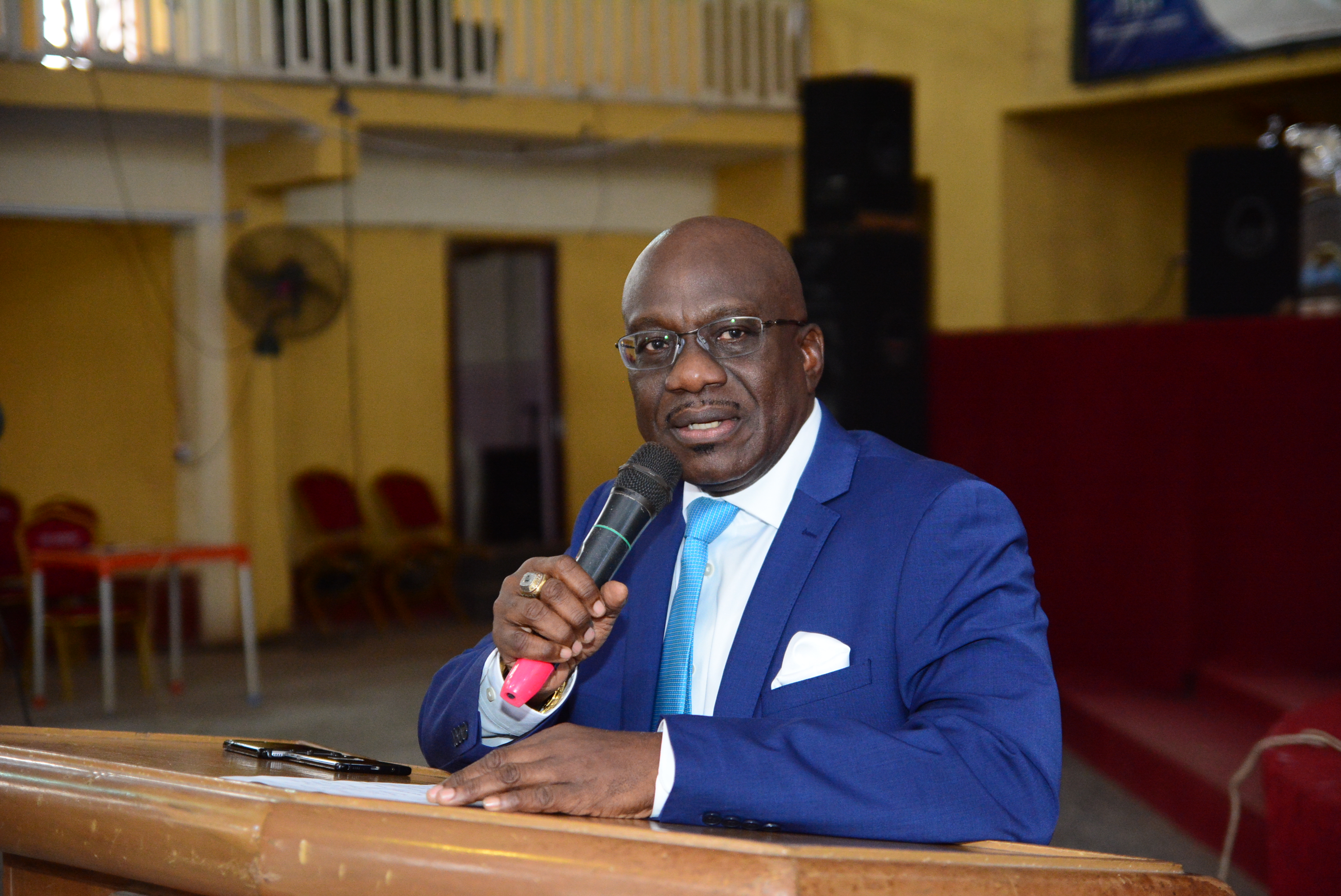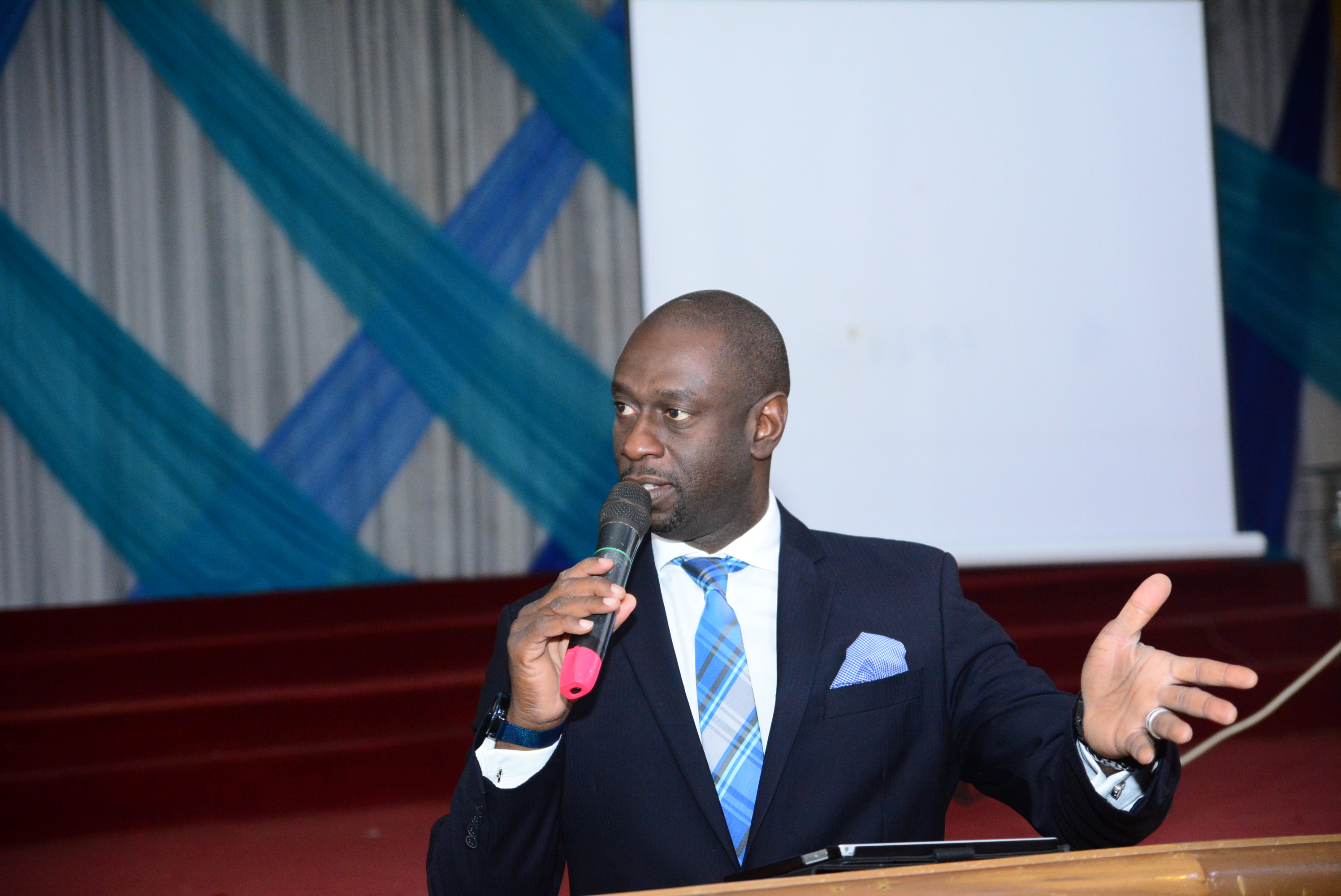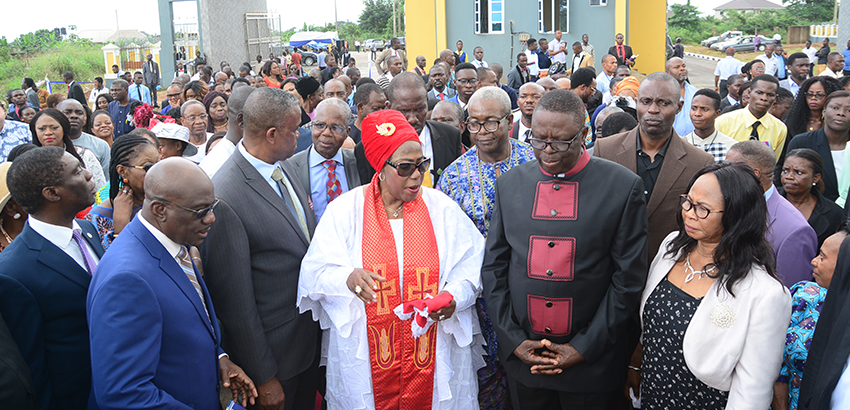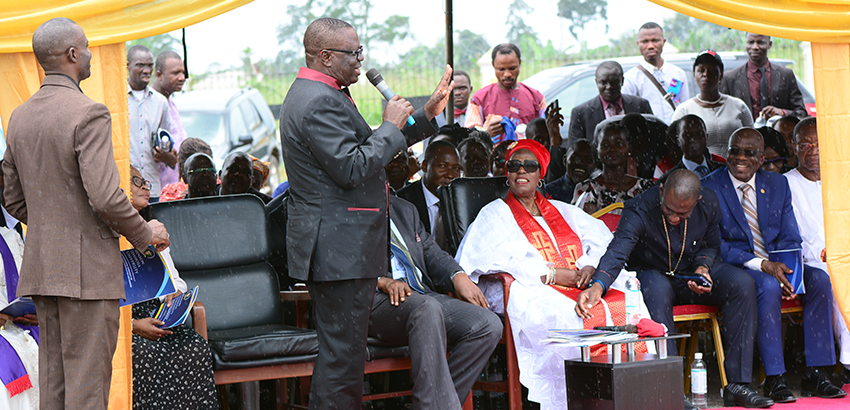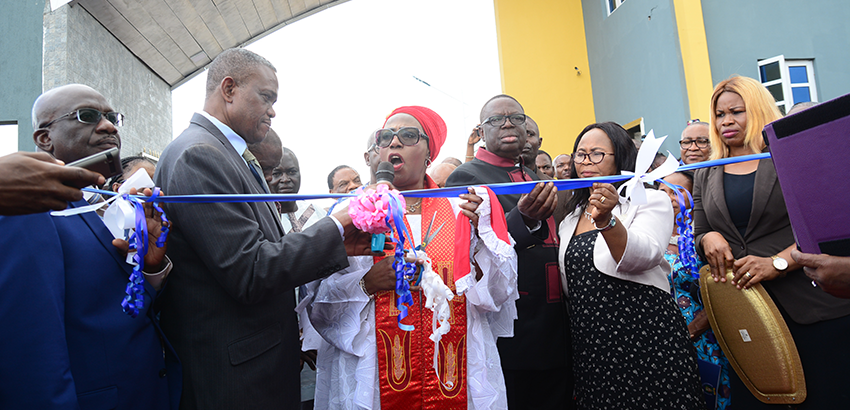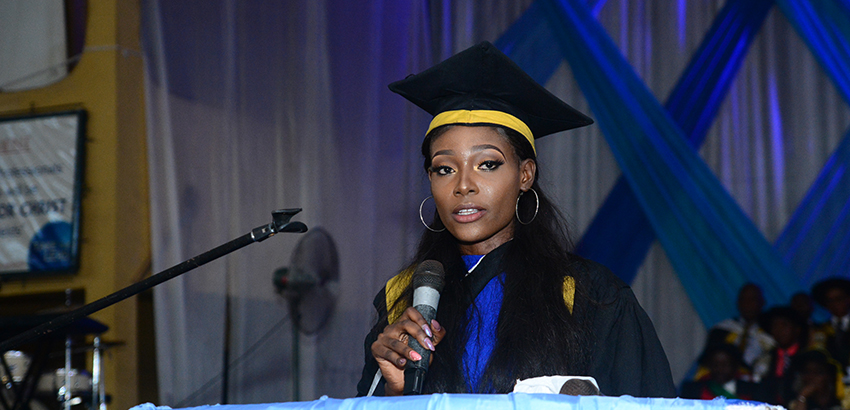Archives for the Year: 2018
The Vice Chancellor of Benson Idahosa University, Prof. Sam Guobadia has charged staff members to make integrity, accountability, excellent student experience, teamwork and honesty their watchwords in the discharge of their duties in the new academic session. He gave the charge during the 2018 Staff Orientation Programme for staff members in preparation for the new Academic Session.
He admonished them against engaging in acts that would tarnish their reputation, put them into trouble, and subsequently drag the good name of the University to the mud thereby jeopardizing its value proposition. According to him, the value proposition the University sells to the world is “Academic Excellence with Godliness.” Giving his welcome address, Prof. Sam Guobadia thanked the Management and Staff for their commitment and hard work towards the successful completion and achievements recorded in the last academic year.
Speaking on the “University’s culture, Vision and Mission” the President of Benson Idahosa University, Bishop F.E.B. Idahosa tasked staff members to focus on how to be relentlessly excellent in all ramifications. He said: “For you to raise a leader, you must also be a leader. A follower cannot raise a leader, only a leader can raise a leader.” He added that we are raising people who will have positive influence over our communities.
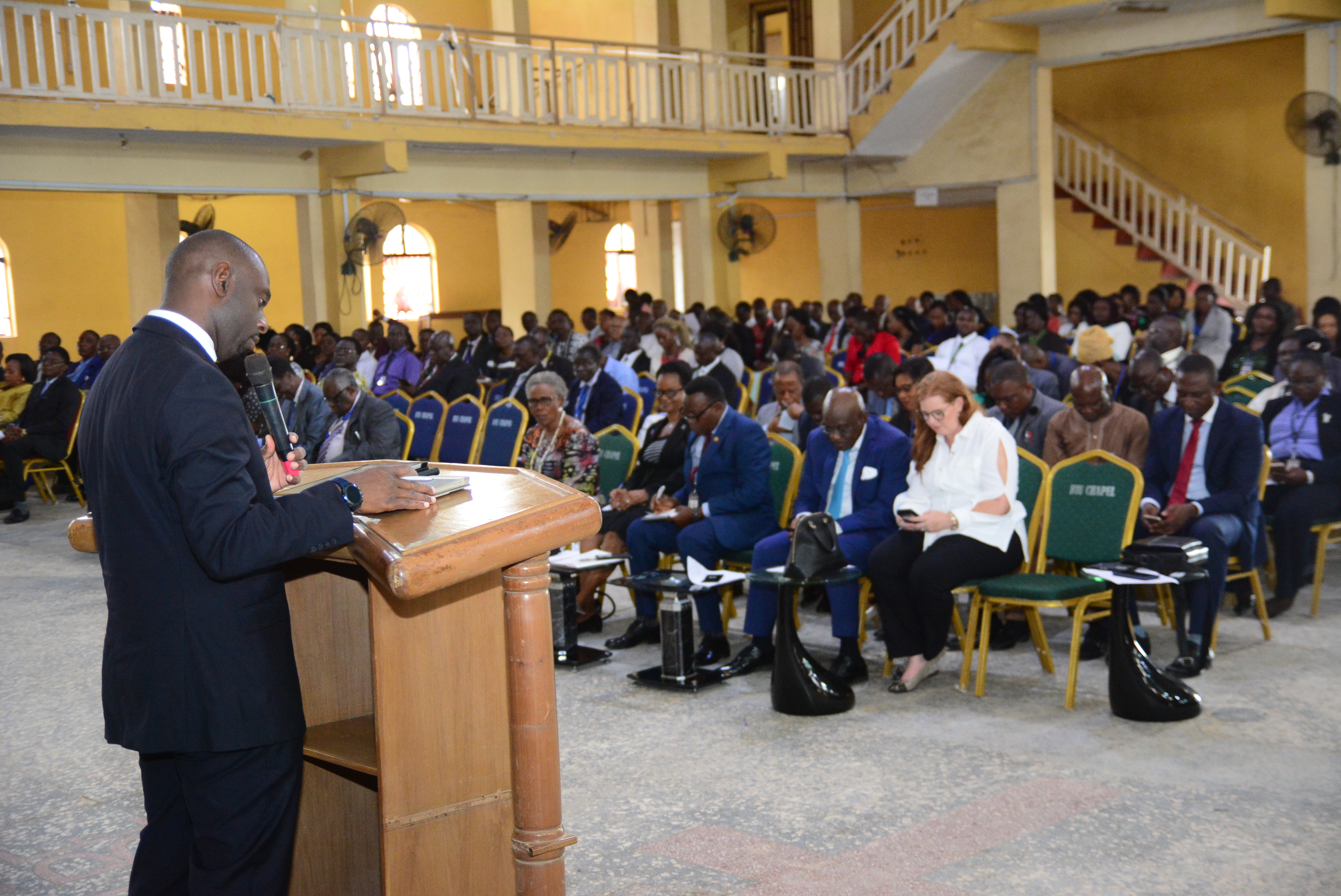
He praised staff members for their steadfastness and commitment to the raising of leaders who are complete in spirit, mind and body, thus contributing to the production of high-level leadership and quality manpower for the nation and the world.
The Registrar, Rev. Mike Okagbare, who spoke on “Disciplined Professional Administrator” charged staff members to know all the rules governing the University. He urged all staff members to be result driven. and set attainable goals in the forthcoming academic session.
World Teachers’ Day, also known as International Teachers Day is a day set aside by the United Nations to appreciate teachers all across the world for the time and effort they pour into lives.
Happy Teacher’s Day!
We are happy to celebrate Customer Service Week because we have the most hard working team of employees who make our customers happy.
HAPPY CUSTOMER SERVICE WEEK!
The Director of CLAREP and Head of English Language Department, Dr. (Mrs.) A. Esimaje, in this interview with the Communication and Brand Strategy Unit, speaks on the CLAREP’s activities, how value on paper qualification encourages plagiarism and how students can develop their reading and writing culture.
Excerpts:
Tell us about CLAREP?
CLAREP is an acronym and its stands for “Centre for Language Research and English Proficiency.” It is an educational, nonprofit, and non-Governmental organization.
What do you do as an organisation?
There are actually two major reasons why we set up this organization. From the name you have language research on one hand, and then you have English proficiency on the other hand. It involves all language related matters, research into how language can enhance productivity, research on how language can help socio- economic and political development of the nation, research on how language can be taught and how language can be understood. When we say language, we mean language broadly, not necessarily English Language but any research into any type of language.
Now the proficiencies part has to do with certifications, ensuring that people are proficient in the different skills of language. At the centre, we are licensed to teach languages like German, Spanish, and not just English. So we can teach proficiencies, and then people can write such exams as Test of English as a Foreign (TOEFL), International English Language testing system (IELTS) and other language proficiency exams. We focus on writing skills, speaking skills, reading skills, and any skill of language at all.
How old is the organization?
The organization is two years old.
What is your organization doing to ensure a lasting reading and writing culture in young Nigerians?
Some years ago the National Universities Commission (NUC), was so concerned about the reading culture of students in Nigerian universities and the fact that students are in school because they have to be here, they do not want to be in school.
You want to earn a living; you want to be counted among the socio-class so you go to school. There was a time I also asked who started the idea of school, so I asked that same question. So once exams are over, students forget whatsoever it is.
So NUC recommended that universities should begin reading clubs in order to encourage the development of reading culture. According to NUC, universities should also target young categories of children in nursery, primary and secondary schools to start reading clubs, so by the time these children get to the university, they are able to read and also love reading.
We have CLAREP Young Reader’s Club. The aim of reading club is supposed to be for readers but you know this is Nigeria so we have two groups of children; those who can read and those who cannot read and so we teach one group how to read and the other group how to love and enjoy reading. So as an organization we also help to develop the reading culture of students
What do you think is the major reason for plagiarism?
It’s easily the absence of knowledge; this is because you don’t copy what you know. If you know something you will write it, so it’s the absence of knowledge, the absence of requisite knowledge, relevant knowledge.
Most times it is not always the fault of the students who do that, it is the fault of the system. I believe that we are attaining towards a systematic failure, when students are not equipped with what it takes to write project and then it is mandatory for them to write project, so without the project they do not graduate yet they do not have what it takes to write it.
Now, they are forced to write it anyhow and one way to write it is to plagiarise or to use what I call academic vendors. These are people who put together this project for students. So they pay academic vendors and the vendors will source the material from different places and do what is called patch writing or what you call cut and paste. The student submits it and during defense the student is unable to defend it because the ideas are not original. The fault is not fully from the students that plagiarise, but the fault of the system that has failed to prepare the students sufficiently to write the project. It’s also failure of the society, the general society that place value on paper qualification.
That’s a systematic failure, why do we need to have foreign publications, when I travel out they do not ask for foreign publications, a lecturer that is in the UK is assessed based on what he has written in the UK, he is not told to publish in America, Germany, Nigeria. But then a different system produces a lecturer and a different system is used to assess the lecturer.
What should come first in your own opinion: writing or reading?
The first skill is listening followed by speaking and then followed by writing because the letters that you write are the letters that you use to form the words which you eventually read.
No, because reading feeds writing so they play complimentary roles the more you read, depending on what you read the better writer you will become but the foundation will have to be letters of the alphabets which you learn at the stage of reading, reading is so key, because in reading you learn more vocabulary, structure, you use for writing.
What is your advice for young writers and authors?
Well, I will like to say that because every writer is produced by the society, the motivation for writing should be from the society, and when you write even though many people write for pleasure, I often say write also because you want to meet a need. In the process of writing for whatever it is that makes you happy pass on a message and that message will be borne out of the need in your society. So look at your society, see what you can contribute through that skill that you have, through that gift that you have, ensure that what you write is not only for enjoyment but ensure that it also has a message.
In commemoration of the 50th anniversary of Church of God Mission International, a lot of activities took place during the week. The week-long anniversary coincides with the 20th remembrance of our founder, late Archbishop Benson Idahosa.
Here are some pictures from the celebration
The Chancellor of Benson Idahosa University (BIU), Archbishop Margaret Idahosa has commissioned the 1.2 kilometer dual carriage road constructed and donated by the Managing Director of Ray Royal Construction Company, Bishop (Dr.) Matthew Akhaze Okpebholo, at the University’s Legacy Campus in Okha, Benin City.
A total of 49 out of 602 students bagged First Class degrees in the 2017/2018 academic session. The Acting Vice Chancellor, Prof. Sam Guobadia made this known during the 14th Convocation Ceremonies. According to him, 84 students were awarded Second Class (Upper Division) degrees, 318 received Second Class (Lower Division) degrees while 52 got Third Class degrees.The University also awarded a Doctor of Philosophy (PhD.) degree, 60 Masters degrees and 38 Postgraduate diplomas.
He charged the graduating students to effect total change in the style of governance by implementing ideas of other successful democracies around the world. “The world right now needs credible leaders who actually have the interest of its citizens as priority. The old style of governance has failed, the situation is chaotic and the hunt for credible leaders is on. We implore you to go out there, and be the hope of our country. We are very confident that you all have been raised as such leaders, worthy in character, in learning, and as effective disciples of Christ, that will change Nigeria.”
Prof. Guobadia, however, encouraged the students to be brave and never despair as they have been empowered with life set skills that will make them contribute immensely to the development of Nigeria. He also urged the graduating students to be good ambassadors of the University wherever they find themselves.
Highlighting the achievements of the University, he mentioned that all degree programmes offered at the University have been accredited by the National Universities Commission (NUC), and other regulatory bodies like the Council of Legal Education (CLE) and the Institute of Chartered Accountants of Nigeria (ICAN), among others.
He also revealed that the University would be introducing the Faculty of Basic Medical and Health Sciences. The Faculty will offer degree programmes in Nursing and Medical Lab Sciences, precursors to a full Medical School. Speaking on the development at the Legacy Campus, the Acting Vice Chancellor said the Dr. Chris Oyakhilome Faculty of Engineering Complex, the Bishop Matthew Okpebholo Road and the on-going construction of the main access road had reached 90 per cent completion. These projects, according to him, are due for commissioning at the commencement of the 2018/2019 academic session.
The President of Benson Idahosa University, Bishop F.E.B. Idahosa urged the students to be the generation that will take up the task to really change Nigeria. According to him, Nigeria’s current situation has forced a responsibility on them. He said: “When you leave campus and hit the real world, you will not get everything handed to you on a silver platter. The real world will hand out a dose of seriousness that will sober you. Do not talk about your dreams, chase them into the future and drag them into your present. Do not hope for them because hope is not a business plan.
Speaking at the ceremony, the Pro-Chancellor, Engr. (Dr.) G.O Isibor while congratulating the students, admonished them to go out, increase and inherit the earth. He said the “Class of F.A.M.E” is the University’s secret weapon to change Nigeria, for the good and for the better.
The Pro-Chancellor who is the Chairman of the University Governing Council, urged the students to be professionals and entrepreneurs who will be effective disciples of Christ.
Delivering her Valedictory speech on behalf of the graduating class, Juliet Ezekiel, the overall best graduating student said that persistence through failure is the story of her success.
She said: “Failure makes you hungry and humble. Failure forces us to confront our fears. Failure has made a lot of us great and powerful mentors today.”
“Fellow graduates, we have all made sacrifices to be where we are today but I must admit that my experiences have given me an inner security that I would never have attained easily passing examinations. Failure made me discover that I have a strong will, more discipline and determination than I ever expected”
Juliet Ezekiel, a graduate of Computer Science who recorded a Cumulative Grade Point Aggregate (CGPA) of 3.95 said she faced a lot of challenges while in school but focused on her priorities.
In her speech, Juliet expressed gratitude to God for making her feat possible and promised to always strive for excellence. She advised her fellow graduands to be of good behaviour anywhere they found themselves.
The occasion was graced by dignitaries across the country, including the Chief Judge of Edo State, Justice (Mrs.) Esohe Ikponwen, NUC’s Director of Accreditation, Dr. Noel Salihu , and Vice-Chancellors of various universities across the country and traditional rulers.
It was all celebration at the 14th Convocation of the Benson Idahosa University (BIU). But for the Best Graduating Student, Juliet Ezekiel, it was a moment of reflection. She finished from the Department of Computer Science with a Cumulative Grade Point Average (CGPA) of 3.95 on a scale of 4.0.
She became the cynosure of all eyes as she stepped out to receive the President’s Prize and Dr Goddie Isibor’s Prize for the Best Graduating Student, among others.
Juliet, while delivering her valedictory speech, said failure taught her things that she could not have learnt anywhere.
She said: “Fellow graduates, we have all made sacrifices to be where we are today, but I must admit that my experiences have given me an inner security that I would never have attained by easily passing examination. Failure taught me things that I couldn’t have learnt if I had achieved success easily. I discovered I have a strong will, discipline and determination than I ever expected.”
Juliet narrated how she felt after failing the Unified Tertiary Matriculation Examination (UTME). According to her, persistence through failure was the key to her success.
She said: “Fresh out of a successful Senior School Certificate Examination (SSCE), I experienced my first failure when I took my first UTME. I failed to reach the cut off mark and I was left with the option of registering for a pre-degree programme at Ambrose Ali University in Ekpoma, which was solely dependent on me meeting the cut off mark for my next UTME.
“Once again, I experienced another failure as I didn’t meet the cut off mark. Realising the financial stress I had caused my parents, I made a promise that I will never disappoint them again. I learned to embrace my failure instead of dwelling on them and giving up. I treated my failure as a stepping stone to greater heights.”
She admitted that her academic journey at BIU was “rigorous and herculean”, noting that it was not all rosy for her parents to provide finance. Juliet said in spite of her quest to become the best, she was able to combine other social activities to make her stay on the campus worthwhile.
She added that it was by God’s grace and a combination of hard work that she was able to achieve success. She thanked the school founder and the management for creating environment that enabled students achieve excellence.
Convocation Service:
Bishop (Dr.) Festus Akhimen CGMI, Abuja Bishopric
Date : Friday, July 6, 2018
Convocation Lecture:
Prof. Abubakar Rasheed, NUC, Executive Secretary
Date: Friday, July 6, 2018
Convocation Day Proper
Date : Saturday, July, 2018.
